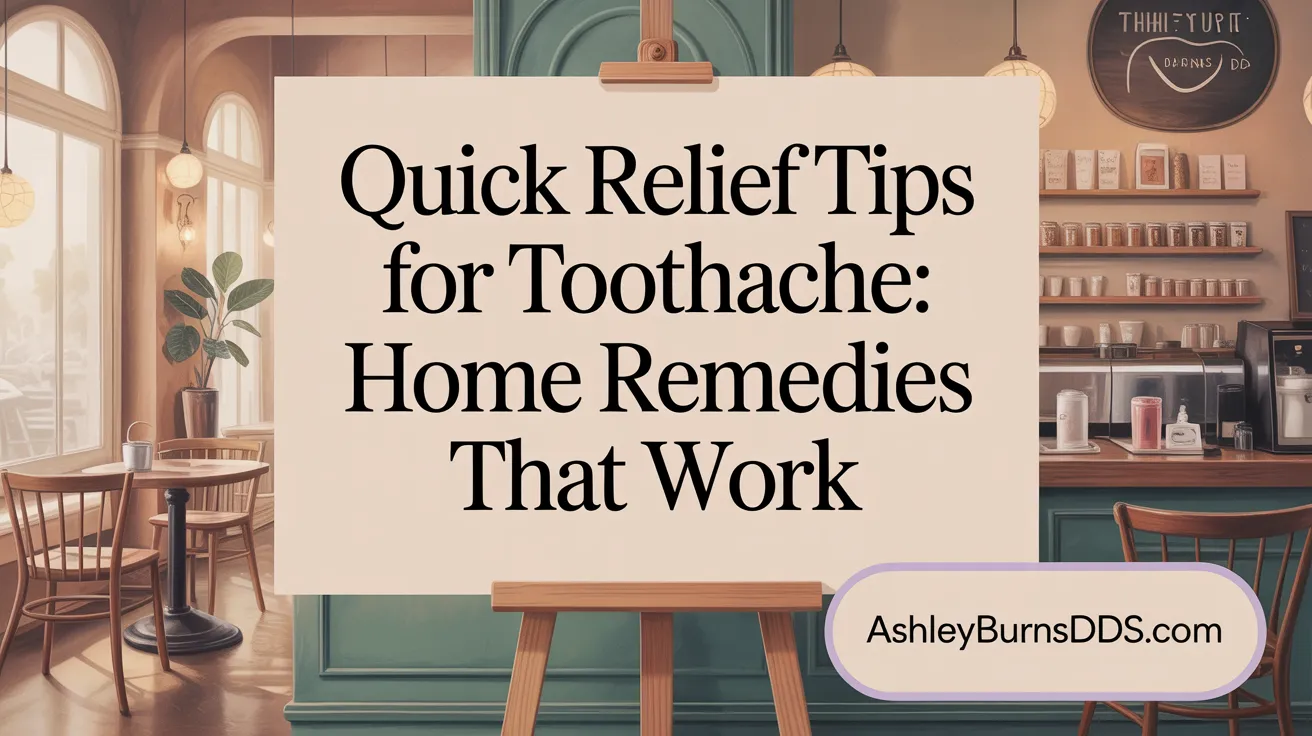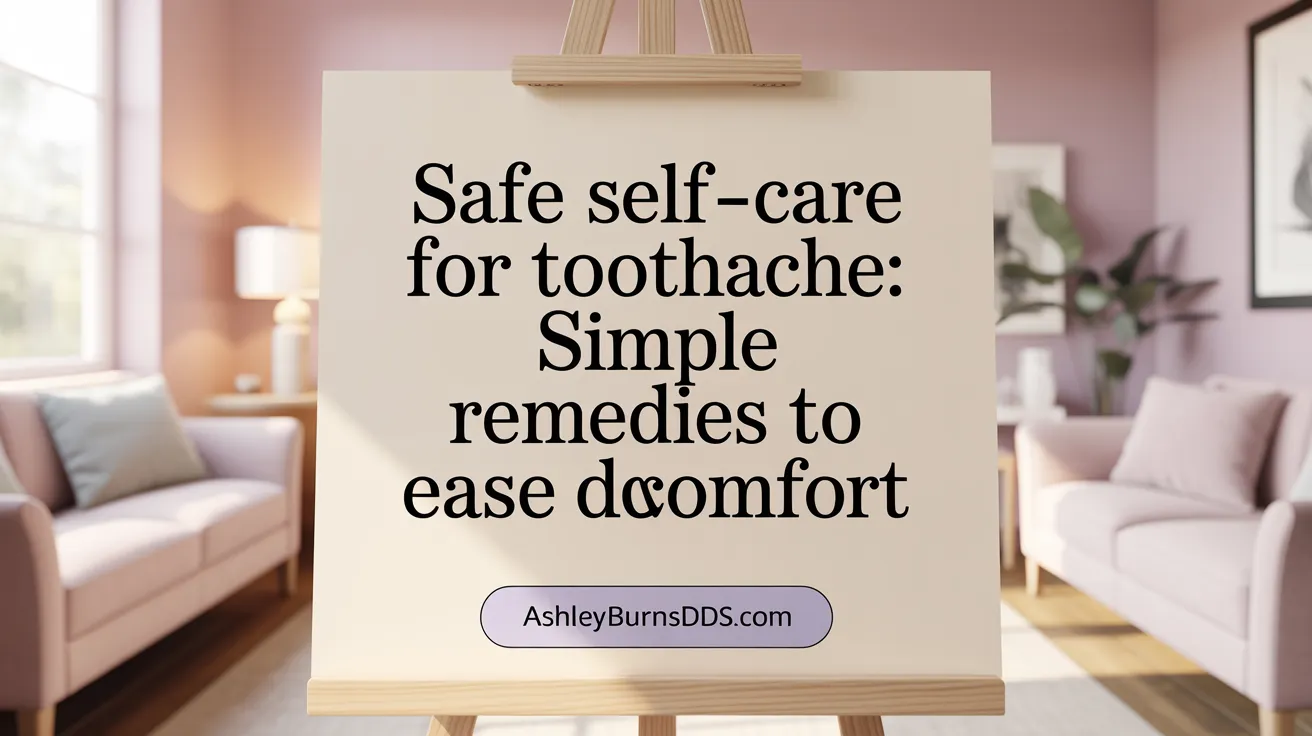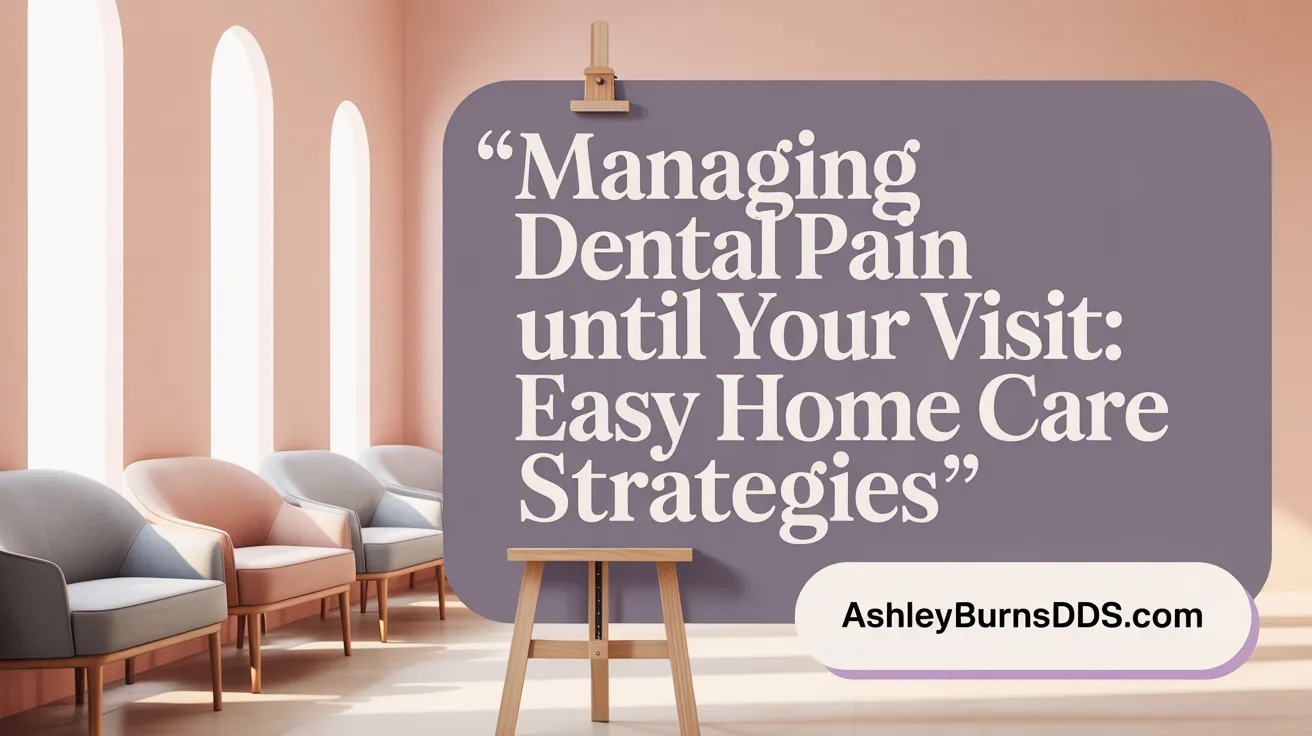Understanding and Managing Dental Pain at Home
Dental pain can be distressing and disruptive, especially when waiting for a dental appointment. Understanding the causes of toothache and learning practical ways to alleviate discomfort temporarily can make this waiting period more manageable. This article explores safe home remedies, self-care tips, and how to recognize when dental pain requires urgent attention, ensuring you manage your discomfort effectively until professional treatment is available.
Common Causes and Symptoms of Dental Pain

What are the common causes of dental pain and the symptoms that indicate the need for pain relief?
Dental pain can stem from a variety of issues affecting the teeth, gums, and surrounding tissues. Some of the most common causes include tooth decay, cavities, and bacterial infections like dental abscesses. Other causes are cracked or fractured teeth, gum disease (gingivitis or periodontitis), and trauma from injury or impact.
Symptoms indicating a need for pain relief often include sharp, throbbing, or ongoing discomfort. Increased sensitivity to hot, cold, or pressure is common, along with swelling, redness, and sometimes a bad taste or foul odor if an infection is present.
In more serious cases, severe pain may be accompanied by fever, chills, swelling in the face or neck, and difficulty swallowing or opening the mouth. These signs suggest infection or other urgent conditions requiring immediate dental care.
Lesser symptoms, such as dull aches or discomfort after dental procedures or while brushing, may also call for temporary home remedies like rinsing with salt water or applying cold compresses, alongside scheduling professional treatment.
Early recognition of these symptoms helps determine when simple home care can provide relief and when quick intervention by a dentist is needed to prevent complications.
Practical Tips for Temporary Dental Pain Relief
 When facing dental discomfort before your scheduled dental appointment, there are several simple and effective home remedies that can provide temporary relief.
When facing dental discomfort before your scheduled dental appointment, there are several simple and effective home remedies that can provide temporary relief.
A cold compress is one of the most immediate options. Wrap an ice pack or a cold pack in a towel and place it on the outside of your cheek over the painful area for about 20 minutes. This helps reduce swelling and numbs the nerve endings, alleviating pain.
Another soothing method is rinsing your mouth with warm salt water. Mix half a teaspoon of salt into a glass of warm water and swish it gently for around 30 seconds before spitting out. This solution can help calm inflammation, clean out bacteria, and ease oral irritation.
Natural remedies such as clove oil can also be effective. Dip a small piece of cotton swab in clove oil, which contains eugenol—a natural numbing agent—and carefully place it on the affected gum or tooth. Be cautious not to swallow the oil and use it only for short-term relief.
Over-the-counter pain medications like ibuprofen or acetaminophen are useful for managing pain temporarily. Follow dosing instructions carefully and consult your healthcare provider if unsure.
Maintaining oral hygiene is crucial. Continue brushing gently with a soft toothbrush and flossing to remove debris and plaque that might worsen discomfort.
Lastly, avoid foods and drinks that are very hot, cold, sugary, or acidic, as these can increase tooth sensitivity and pain.
These measures help manage discomfort effectively until you can see a dentist for definitive treatment. However, persistent or severe pain, swelling, or signs of infection should prompt immediate professional dental care.
| Treatment Method | How It Works | Precautions |
|---|---|---|
| Cold compress | Reduces swelling and numbs pain | Limit to 20 minutes, use a cloth barrier |
| Warm salt water rinse | Eases irritation, cleans bacterial buildup | Do not swallow, rinse 2-3 times daily |
| Clove oil application | Natural anesthetic, antimicrobial | Use only short-term, do not swallow |
| Over-the-counter meds | Blocks pain pathways, reduces inflammation | Follow dosing instructions, avoid overuse |
| Oral hygiene practices | Removes food and plaque | Use gentle brushing to prevent additional irritation |
Safe Home Remedies and Self-Care Measures for Toothache

What self-care and first aid measures can be taken to manage a toothache temporarily?
When experiencing a toothache, immediate self-care can provide temporary relief until professional dental treatment is available. Rinsing your mouth with warm salt water is a simple yet effective remedy. Mix half a teaspoon of salt in approximately 8 ounces of warm water and swish it around your mouth for about 30 seconds. This helps reduce inflammation, fight bacterial infections, and promote healing.
Another beneficial rinse involves a diluted hydrogen peroxide solution. Use 3% hydrogen peroxide mixed equally with water. Swish this mixture for 30 seconds to help eliminate bacteria and soothe discomfort. Be careful not to swallow the solution, and spit it out after rinsing.
Applying a cold compress or ice pack on the outside of your cheek near the painful area can significantly reduce pain and swelling. Wrap the ice or cold pack in a cloth to prevent frostbite, and apply it for 10-20 minutes at a time. This causes blood vessels to constrict, which can dull pain and decrease inflammation.
Over-the-counter pain relievers, such as acetaminophen (Tylenol) or NSAIDs like ibuprofen (Advil, Motrin), can be taken following the dosing instructions. These medications help manage pain and reduce inflammation.
Natural remedies also exist for short-term relief. Applying a small amount of clove oil directly to the gums around the affected tooth can numb the area due to eugenol's local anesthetic properties. Similarly, crushed garlic mixed with salt can act as a natural antibacterial agent, and vanilla extract may also have soothing effects.
Practicing good oral hygiene during a toothache is vital. Gentle brushing, flossing to remove trapped food particles, and rinsing with warm salt water or antimicrobial mouthwash can help prevent further bacterial buildup.
Lastly, consider using temporary dental filling kits if the cavity or damage is exposed. These can provide a short-term seal to reduce pain until you see a dentist.
Remember, these self-care strategies are only temporary. They do not treat the underlying cause of the problem. Prompt dental evaluation is the best course of action to address persistent or severe tooth pain.
How to Handle Dental Discomfort Until Your Appointment

How can dental discomfort be handled effectively until a scheduled dental appointment?
Managing dental pain temporarily involves a combination of home remedies and gentle care practices. Rinsing your mouth with warm salt water is an effective first step; dissolve half a teaspoon of salt in eight ounces of warm water and swish it around your mouth for about 30 seconds. This not only reduces bacteria but also helps calm inflammation.
Applying a cold compress or ice pack to the outside of your cheek near the painful area can significantly decrease swelling and numb the discomfort. Use the ice pack for intervals of about 10-20 minutes, with a cloth barrier to protect your skin.
Over-the-counter pain relievers such as ibuprofen or acetaminophen can also provide relief. Make sure to follow the dosing instructions carefully and consult your healthcare provider if necessary.
Maintaining good oral hygiene is crucial, even when experiencing pain. Use a soft toothbrush and gentle techniques to brush the affected area. Floss carefully to remove any food debris or plaque that might be aggravating the pain. Avoid hot, cold, sugary, or acidic foods that can trigger sensitivity or worsen discomfort.
Topical gels containing benzocaine can offer localized relief. Apply these with caution, following package instructions, and avoid excessive use, especially in children, due to potential side effects.
Natural remedies such as clove oil—applied carefully with a cotton swab—can temporarily numb the area because of their natural anesthetic properties.
It is important to keep a close watch on your symptoms. If you experience severe pain, swelling, fever, or signs of infection, seek emergency dental care immediately. Persistent or worsening symptoms require prompt professional evaluation.
Remember, these measures are only temporary. Scheduling and attending a dental appointment as soon as possible is essential for diagnosing and treating the underlying cause of your dental discomfort and preventing further complications.
Recognizing When Immediate Dental Care Is Required
What signs indicate that urgent or emergency dental care is necessary?
Identifying when to seek immediate dental attention is crucial for preventing further complications. Severe, persistent tooth pain that does not respond to over-the-counter remedies like pain relievers or topical gels often indicates an underlying infection, abscess, or fracture. Such pain can worsen over time and is usually a clear signal that professional treatment is needed.
Visible trauma is another urgent sign. If a tooth has been knocked out, chipped, or cracked, or if there is ongoing bleeding that doesn't stop within about 10 minutes, immediate care is essential. These injuries may lead to infections, nerve damage, or the loss of the tooth if not treated promptly.
Swelling of the gums, face, or jaw is often a sign of infection or abscess. When this swelling is accompanied by fever, difficulty breathing, or swallowing, it indicates a severe infection that requires urgent intervention.
Changes in bite, such as a tooth feeling loose or dislodged, also suggest significant dental issues. Exposed inner layers of the tooth, like the pulp, can become sensitive and infected if not promptly addressed.
Additional signs include soft tissue injuries with bleeding, facial pain spreading beyond the immediate area, or any sudden pain accompanied by fever. All these symptoms can lead to serious complications if ignored, highlighting the importance of seeking professional care quickly.
Why is delayed care risky?
Neglecting dental emergencies can lead to worsening infection, increased pain, difficulty in eating or speaking, and even the spread of infection to other parts of the body. Time-sensitive treatment can preserve the tooth and prevent severe health issues.
If you experience any of these signs or symptoms, consult a dental professional immediately or visit an emergency dental clinic to ensure proper treatment and avoid long-term consequences.
Preventive Measures and Professional Consultation Importance
How can maintaining preventive oral hygiene help in avoiding dental pain?
Good oral hygiene is fundamental in preventing dental pain. Regular brushing with fluoride toothpaste removes plaque and food particles that can lead to decay and infections. Flossing daily helps eliminate debris and plaque between teeth, reducing the risk of cavities and gum disease.
Why should I avoid harmful practices that might worsen dental issues?
Avoiding practices such as using excessive force while brushing, poking or probing the affected gums, or applying aspirin directly on gums is crucial. These actions can cause tissue damage or worsen existing conditions. Additionally, steering clear of hot or cold foods when sensitive can prevent flare-ups.
When is it necessary to consult a dentist?
Seeing a dental professional is essential if pain persists beyond a couple of days, if swelling or bleeding occurs, or if symptoms worsen. Early consultation can prevent minor issues from developing into serious infections, ensuring better health outcomes.
Why is professional dental treatment important instead of solely relying on home remedies?
Home remedies like saltwater rinses, cold compresses, or OTC pain relievers manage symptoms temporarily but do not address the root cause. A dentist can diagnose underlying issues such as cavities, abscesses, or cracked teeth and provide appropriate treatments like fillings, root canals, or crowns.
| Prevention Method | Recommended Practice | Additional Information |
|---|---|---|
| Oral Hygiene | Brush twice daily, floss, rinse with antimicrobial mouthwash | Keeps bacteria and plaque in check, preventing decay |
| Avoid Harmful Foods | Limit sugar, high-acidity drinks, hard foods | Reduces risk of erosion and damage |
| Regular Dental Visits | Routine check-ups and cleanings | Detects problems early and maintains oral health |
| Professional Treatment | Seek prompt dental care | Ensures proper treatment and prevents complications |
Maintaining consistent dental care habits is essential to prevent dental pain and avoid emergency situations. Regular visits to a dentist and good daily practices support long-term oral health and comfort.
Final Thoughts on Managing Tooth Pain Before Your Dental Visit
Managing dental pain at home involves a combination of safe temporary pain relief methods, diligent oral hygiene, and careful symptom monitoring. While remedies such as saltwater rinses, cold compresses, clove oil, and over-the-counter medications can ease discomfort, they are not substitutes for professional dental care. Recognizing critical signs that warrant emergency attention helps prevent complications. Ultimately, securing a timely dental appointment remains essential to address the root causes of dental pain effectively and maintain oral health.
References
- Effective Solutions for Tooth Pain From Local Experts
- Toothache: First aid
- How to Manage Tooth Pain While Waiting for Your Dental ...
- 6 Tips to Control Root Canal Pain Until Your Appointment
- What to Do for a Toothache? Make a Dentist Appointment
- How Can You Relieve Tooth Pain Before You See an ...
- Toothache: Symptoms, Causes & Remedies
- How To Manage Dental Pain Until Your Appointment
- How to Manage Cavity Pain
- Dental Emergency: Signs You Need to See a Dentist ASAP
